by DJHS Archivist | Apr 16, 2020 | From the Archive |
These four red ration coins from World War II were created by the Office of Price Administration, after the United States was attacked at Pearl Harbor.
“The functions of the OPA were originally to control money (price controls) and rents after the outbreak of World War II.” The tokens were used from 1942-1945, and each household would receive an allotted amount based on job, number of family members, ages, children, handicapped, and elderly. “Red OPA,’ used for meats and fats, are a lot more common than blue ones, which were used for processed foods.
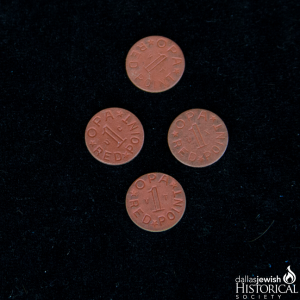
by DJHS Archivist | Apr 14, 2020 | From the Archive |
This is a two way millinery form. With the starting hat size of 6 5/8 or 20 7/8 inches, it is the size of a youth’s hat. The middle bar rotates to open the form from both the top and bottom to create a bigger size, or for proper hat storage.
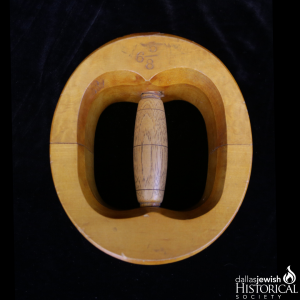
by DJHS Archivist | Apr 9, 2020 | From the Archive |
This Camp Wallace Wallet made of blue and green stamped leather, and bound with leather twine, in green, red, and white was donated by Alex Ray as part of the Ray Family Collection.
Camp Wallace was named after Colonel Elmer J. Wallace and opened on February 1, 1941. It was eventually used for training for antiaircraft units during World War II, and was used as a German Prisoner of War detention camp throughout the war.
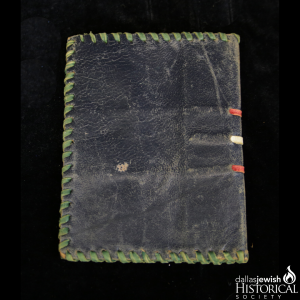
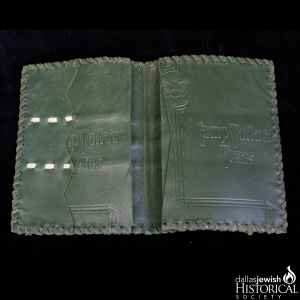
by DJHS Archivist | Apr 7, 2020 | From the Archive |
This No. 3A Folding Pocket Ansco camera was purchased in Dallas and given as a gift to Frances Wolfe Garber “F.B.W”, as a Forest Avenue High graduation present in 1923.
Originally priced at $25.00 back in 1913, this camera was well worth the investment, as it was still operational in 1972 when Frances traveled with it to Israel. The camera features two tripod sockets, 3 1/4 x 5 1/2 inch film negatives, and the ruby window on the back of the camera indicates what number photo you’re on.
Donated September 11, 1995
Frances Wolfe Garber Collection
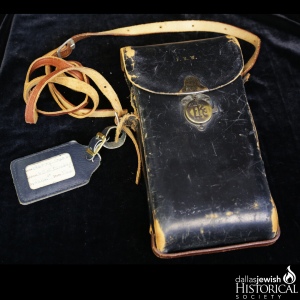
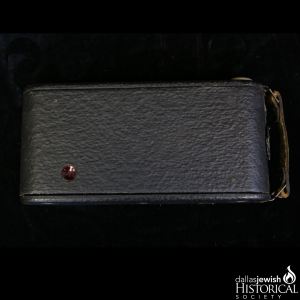
by DJHS Archivist | Apr 2, 2020 | From the Archive |
This 1940s paperweight includes advertising for the Dallas company “Rubenstein Produce Company.”
Started by Sidney J. Rubenstein and located on 1110 Hall Street in Dallas. The paperweight features two tiny moving dice, with the saying “You’re not taking any chances when you trade with Rubenstein Produce Company.”
This style of paperweight advertising was popular in the 1940s across the United States.
Rubenstein Produce Company Collection
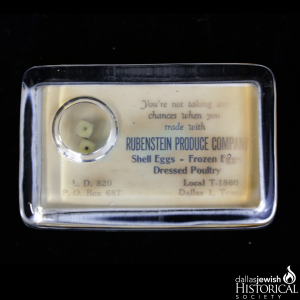
by DJHS Archivist | Mar 31, 2020 | From the Archive |
Alexander Sanger, one of the five Sanger brothers of Dallas, was in the business of dry goods and retail. He was a successful business owner, but also helped organize and start the Texas State Fair; serving as the director from its start in 1886.
This coin was given to Alexander Sanger by The Texas State Fair & Dallas Exposition Association in 1894, which was its ninth year running, in appreciation of his time and efforts spent as president. The coin features Sanger’s portrait in profile in the middle of the coin.
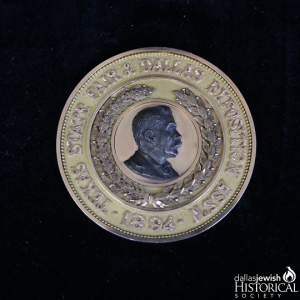
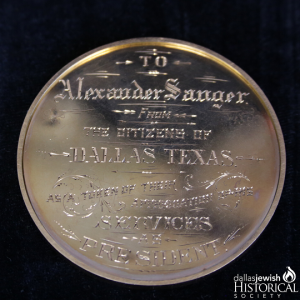










Recent Comments